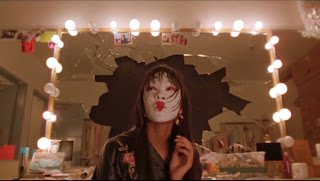Brick
(2005)
Directed by- Rian Johnson
*Joseph Gordon-Levitt, Nora Zehetner, Matt O'Leary, Noah Fleiss, Lukas Haas, Emilie de Ravin
All of it, the film's premise and characters are based in a world complete in itself. Replete with not just school archetypes but also the essential players of a film noir this movie is a treat and challenge as it unfolds its coils and the veil of mystery is gradually lifted.
Drawing inspiration from some great works of film noir, namely Chinatown in its visuals and trumpet solos and the works of a one, Dashiell Hammett the film is not just an homage but a great work in its own right with its unique style and setting.
The snazzy jump cuts and homemade, dreamy effects create a world of illusion which works. The seedy locales (one of which is uncannily reminiscent of The Third Man) provide a most eerie setting that plays a character of its own.
But its Johnson's teenaged characters, all having their own agenda that ground this film into a pseudo-reality we love to be deceived into.
The drug lord, his berserk muscle man, venomous femme fatale, the scrawny and bespectacled protagonist and his behind-the-scenes aid all slide perfectly into this teenage thriller that deals with some really grave problems like drug addiction and OD'ing.
An independent production both written and directed by Johnson, it is innovative, daring and has a reality about it that makes it a legitimate effort despite depending on a rather fantastic setup.
The music by cousin Nathan Johnson is an unusual mix of tunes that remind you of the noir genre while also maintaining a secrecy and edge to the film, with the use of utensils and glass instruments.
The plot which is suspended on past events and explores the protagonist's quest for answers seems convoluted a bit, but by the end all essential ends are tied up while maintaining respectable ambiguity.
The confusion at knowing so little is more than made up by the taut pacing, gritty editing and gradual revelations.
Gordon-Levitt's performance as the subdued yet resilient Brendan packs a sublime punch. His mannerisms and actions are delightful and he slithers into this character perfectly.
Other cast members do a fine job too.
Nora Zehetner's untrustworthy femme fatale seems a bit pale compared to the sultry Kara of Meagan Good.
Overall a very good film which satisfies its purpose and works on an alternate reality as real as ours. (It reminded me of those teen mystery novels from childhood which tackled their subject in a very mature manner)
I loved the wacky terminologies (whichever I managed to grasp) and the whole environment it created.
Very watchable at a respectable length of 110 minutes.
Rating- 3.7/5








